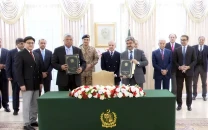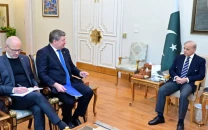Resurrection
Barely has the baton passed, that the team’s openers have already started swinging

The writer is a barrister and columnist.
He tweets @AsadRahim. The views expressed are his own
He said, ‘The principal thing, however, is that I have no desire to live these thirty-five years of service over again, so full of struggle they have been, so painful in retrospect.’
Back then, ‘service’ was thought a burden: the public servant would give it his all, and at the appointed hour, it would all come to an end. But somewhere along the way, we became a nation of the overextended. Our prime ministers have no term limits, dinosaurs stalk the bureaucracy, army chiefs swipe extensions, even cricket captains require dragging away kicking and screaming.
Little of it is to do with love for country, and more to do with the nature of public service — why add value when you can seek rent? This of course misses why they invented term limits in the first place: you can’t change the system once you’re vested in it.

It took the army chief to be reminded of that again. General Raheel Sharif is leaving on time, after both his predecessors took 16 years between them to depart in disgrace. What’s more distressing: the fact that a timely transition came after two decades, or that so many were second-guessing it in the first place?
And for all manner of reasons. You had the Cherry Blossom brigade: ‘jaanay ki baatein jaanay do’. Whatever their intentions, the fan-boys missed out that any extension, for any officer, would be the worst thing for the army.
Then you had the hacks; the ones that keep telling us Pakistan’s an army with a state, not a state with an army (an axiom so dead, it was lifted from the Prussians). If the general’s fans put up posters at home, his critics wrote op-eds abroad. Raiwind March was the symptom, they said, and Dawn Leaks would be the cause. Through it all, the swansong came and went, and no extension was had.
May we also throw in the nutcases — the ones that began slamming the general for not launching a coup (about as bad as those that thought it merited praise). And then, as if the discussion couldn’t get any damper, in came Team Charhta Suraj.
Barely has the baton passed, that the team’s openers have already started swinging. First, the summary goes, the general was glorified beyond measure. Second, the person of Raheel Sharif took on more weight than the rest of the army. Third, Zarb-e-Azb was merely the payload after years of hard work by General Kayani.
For context’s sake, bear in mind that previous chiefs massacred Bangladeshis, lost a war, rigged the polls, passed vicious laws, enriched their brothers and sons, and blew up Jalalabad. The best the anti-Raheel brigade can come up with is taking too much credit and tweeting too many memes.
But assess we must. It’s a distant dream now, but let’s remember the Pakistan from 2013. This column reads from months ago: ‘Forget the south, the Muslim League wasn’t even taking on the north. 2013 was proof of as much: talk to the Taliban. Dilly-dally on North Waziristan. Watch them blow up the courts in Islamabad. Professor Ibrahim may yet cut us a deal.’
This also ties in with the gents lauding General Kayani and attributing Zarb-e-Azb to the groundwork he did. No doubt General Kayani turned the train around, and won back Swat and South Waziristan. But let’s not kid ourselves: Pakistan was drowning. General Kayani took over at the end of 2007 and left at the end of 2013. Were we even to forget Osama and Salala, the general oversaw a 97% spike in civilian deaths to terror (per SATP), with Karachi recording the bloodiest years in its history.
It is said that the Mughals’ Humayun left his enemies half-defeated, inviting endless attack. General Kayani’s indecision over North Waziristan cost us dearly — as Major-General Athar Abbas said, ‘For six years, he [General Kayani] kept vacillating over the issue and in six months, [General Raheel] decided that this is the crux of the problem.’
Which brings us to the crux. Raheel Sharif went into North Waziristan at a time when Islamabad couldn’t say the word ‘Taliban.’ He went into Karachi when it was a whirl of target killings. We judge a man by the reputation of his enemies: in that sense, Raheel Sharif had a rogues’ gallery, from Waziristan’s most wanted down to Asif Zardari’s speed-dial, and he took on all comers.
Yes, there was overreach: nature abhors a vacuum. There was overreach into the judicature, because the courts would rather uphold court martials than try terrorists. There was overreach into anti-corruption — because Mr Zardari would rather promote Dr Asim (now the PPP’s Karachi boss) than prosecute him. There was overreach into police ops — because the Punjab police would rather ‘manage’ sectarians than collect evidence against them.
At its simplest, Raheel Sharif’s term was Pakistan’s resurrection. From when he started, he leaves the country with civilian casualties to terror having dropped 80.3%.Those sniping at all the bells and whistles forget where we used to be: demoralised and directionless. An army chief greeting troops on the front and hugging schoolchildren after APS may invite scoffs from an air-conditioned elite — to the vast majority of Pakistanis, it steeled them for the days ahead. The general’s critics may want to contribute to the effort, after they’re done with ironic hashtags.
To be plain, any appreciation’s not enough — not just for the chief but the braves that broke our hearts; the Aitzaz Hasans and Bilal Omers and Faiz Sultans that gave themselves to this war so that we don’t have to. God bless them.
But the road ahead is long: far beyond any army operation, it will take a generation to fix what we have sowed in FATA, in Balochistan, in Southern Punjab. But before Raheel Sharif, we were fighting just to breathe.
As Cormac McCarthy put it, ‘The heart of any culture is to be found in the nature of the hero. Who is that man who is revered?’ The heart of Pakistan, from 2013 to 2016, was the fight for its life. And in a sea of system failure was Raheel Sharif diving in –as McCarthy put it, the very nature of the hero.
Published in The Express Tribune, November 30th, 2016.
Like Opinion & Editorial on Facebook, follow @ETOpEd on Twitter to receive all updates on all our daily pieces.



















COMMENTS
Comments are moderated and generally will be posted if they are on-topic and not abusive.
For more information, please see our Comments FAQ